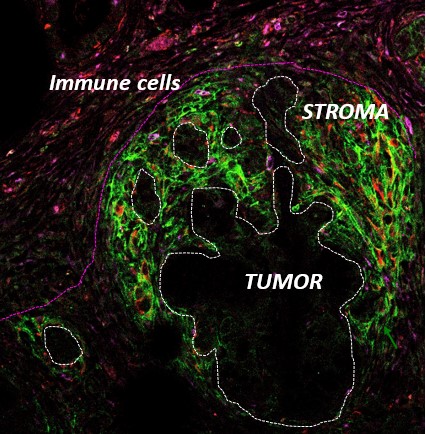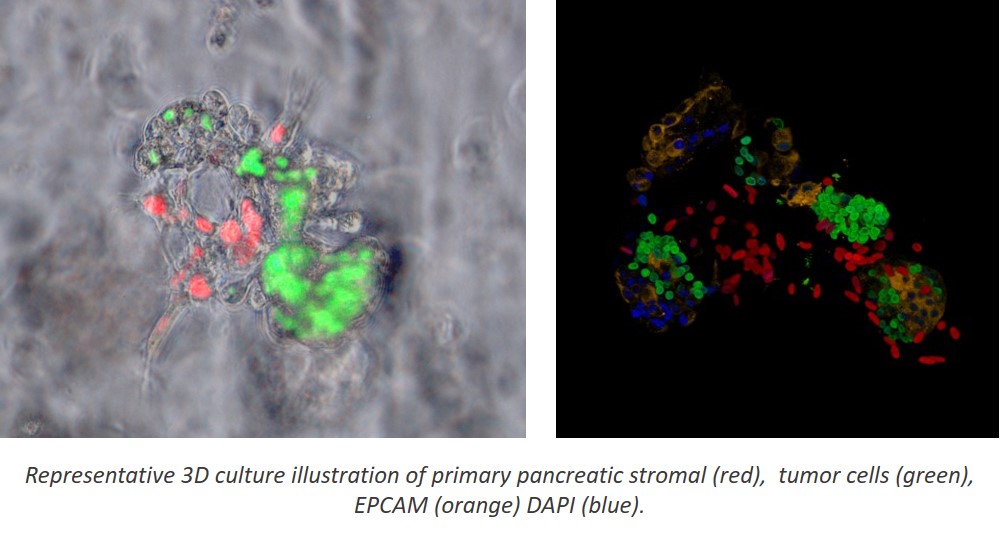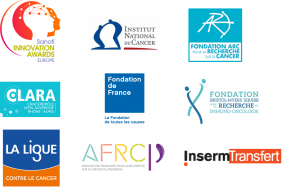Accueil > TERI Department > Oncopharmacology > Jordheim/Dumontet’s team – A Hennino’s group
Jordheim/Dumontet’s team – A Hennino’s group

Representative IF on tumor section in mouse PDAC
Stromal Immune Interactions in Cancer (SIIC)
Pancreatic ductal adenocarcinoma (PDAC) is currently the fourth leading cause of cancer related death in the industrialized world it is predicted to become the 2nd leading cause by 2030. Most of the therapeutic approaches have targeted tumor cells themselves and, until recently, have largely ignored the prominent stroma/desmoplastic reaction that is a characteristic feature of several human cancer including pancreatic cancer. Since few years the contribution of this massive stroma has emerged as a novel actor and contributor of pancreatic tumor initiation and progression. This abundant stromal reaction usually surrounds islands of cancer cells and accounts for 50–80% of the actual tumor volume. It is now well established that PDAC is associated with a profound immune suppression. This phenomenon is largely mediated by the fact that the effective anti-tumoral immune response is unable to “reach” the tumoral zone and remains “physically and functionally” entrapped within the tumor surrounding microenvironment. Moreover, the high density of the pancreatic cancer associated stroma further impairs drug delivery and provides mechanical stiffness.
We recently demonstrated that big-h3/TGFbi (Transforming growth factor-b-induced gene product), an ECM protein, plays an important role in the modulation of tumor microenvironmental stiffness during PDAC. Moreover, we showed that this protein has immune-suppressive properties in the context of both autoimmune disorders and cancer (Patry et al., 2015, Goehrig et al., 2019). big-h3 mediates its actions through binding to type I, II, and IV collagens as well as proteoglycans, biglycan, and decorin and thereby it is a key player during cell-to-cell, cell-to-collagen, and cell-to-matrix interactions.
Our research group mainly explores:
- The role of the mechanical changes on the emergence of pitfalls of the immune-surveillance during the onset of neoplastic lesions indicated by acinar to ductal metaplasia (ADM).
- The relationship between the mechanical stiffness generated by cancer associated fibroblasts (CAFs) and immune cells present within the tumor stroma and the subsequent immune-escape.
- The effect of extracellular matrix protein depletion on the mechanical tension release within the tumor and on the immune-suppression (with a special focus on CD8+T cells and macrophages) in pancreatic cancer.

Publications
https://pubmed.ncbi.nlm.nih.gov/?term=Hennino+A&sort=pubdate
Members
Ana Hennino,PhD CRCN Inserm, Group Leader, ana.hennino@inserm.fr
Berkan Savas, Postdoctoral fellow, berkan.savas@inserm.fr
Kevin Thierry, PhD student kevin.thierry@etu.univ-lyon1.fr
Mélissa Masmoudi, PhD Student melissa.masmoudi@lyon.unicancer.fr
Tiffanie Antonio, Engineer, Tiffanie.ANTONIO@lyon.unicancer.fr
Zoé Catinaud, Mastrer 2, zoe.catinaud@etu.univ-lyon1.fr

